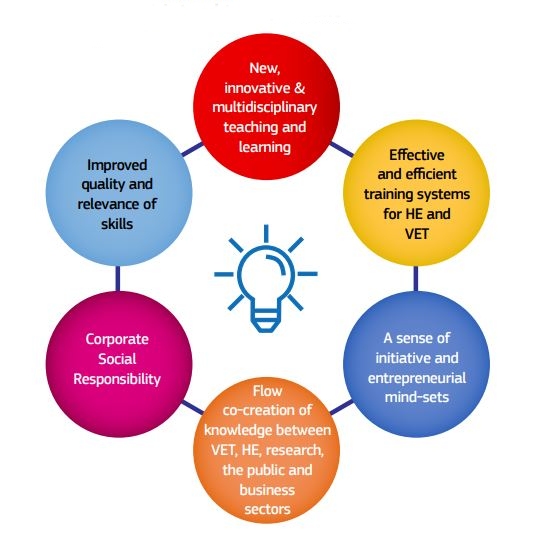Alliances for Innovation fall under the spectrum of the Key Action 2 (KA2) “Cooperation among organisations and institutions” of the Erasmus+ Programme. It seeks to boost European Innovation through cooperation and knowledge sharing. This Erasmus+ action focuses on higher education, initial or continuing vocational education and training (VET), and the broader socioeconomic environment, including research.
Alliances for Innovation wants to train Europeans to acquire new skills and eliminate skill mismatches. For this, it seeks to develop new curricula for Higher education, VET, and to foster the entrepreneurial spirit in Europe.
Alliances for Innovation objectives
The partnerships of Alliances for Innovation focus on the implementation of cross-cutting activities, easily adaptable to new knowledge.
The primary focus of the Alliances for Innovation is to boost digital skills which have become a prerequisite for the modern labour market. Additionally, the twin transition brought forward by the Green Deal demands changes in qualifications and the training curricula to meet the green skills demand to support sustainable development.
Interesting organizations in achieving the objectives of Alliances for Innovation can submit multiple proposals to the following lots:
- Lot 1: Alliances for Education and Enterprises
- Lot 2: Alliances for Sectoral Cooperation on Skills (implementing the ‘Blueprint’)
Lot 1: Alliances for Education and Enterprises
It involves transnational projects in which partners work together to foster innovation, new skills, and entrepreneurship.
Alliances for Education and Enterprises bring together businesses, higher education and vocational training institutions to collaborate. Working within one or more economic sectors, they build reliable and long-term relationships that demonstrate their inventive and international nature.
Each partnership must have at least one VET and one higher education organization. However, they can focus on either or both of these fields.
While each collaboration must contain at least one VET and one higher education organization, they can focus on one or both of these educational disciplines.
Alliances for Education and Enterprises have one or more of the following aims:
- Foster new, innovative and multidisciplinary approaches to teaching and learning,
- foster corporate social responsibility,
- stimulate initiative and entrepreneurial attitudes, mind-sets and skills,
- improve the quality and relevance of skills development and certification,
- facilitate the flow and co-creation of knowledge,
- build and support efficient higher education and vocational education and training systems.

Lot 2: Alliances for Sectoral Cooperation on Skills
Projects under the Alliances for Sectoral Cooperation on Skills attempt to build innovative methods and collaborations for skill development in a particular area. Partnerships will implement a major part of the New Skills Agenda for Europe, the pact for skills.
The Skills Pact will absorb the Blueprint for Sectoral Cooperation on skills as it will be built upon the first. Lot 2 Alliances for Innovation will adopt a sectoral skills plan that will help with the execution of the Pact. This plan must focus on minimizing skills shortages, gaps and mismatches while maintaining an adequate skill level and quality.
Alliances for Sectoral Cooperation on Skills proposals must address the urgent skills demand in working people and emerging occupational profiles (encompassing EQF levels 3-5 as well as EQF 6-8).
Each project must have VET and higher education (HE) organizations and labour market actors. Ideally, they should include policy bodies, certifying bodies, European sectoral associations and industry representatives.
Available Alliances for Innovation calls for proposals
Title: Alliances for Education and Enterprises
Programme: ERASMUS-EDU-2022-PI-ALL-INNO-EDU-ENTERP
Budget: € 62,000,000
Description: These partnerships shall implement a coherent and comprehensive set of sectoral or cross-sectoral activities, which should be adaptable to future knowledge developments across the EU.
To boost innovation, the focus will be on digital skills as they are increasingly important in all job profiles across the entire labour market. Also, the transition to a circular and greener economy needs to be underpinned by changes to qualifications and national education and training curricula to meet emerging professional needs for green skills and sustainable development.
Alliances for Education and Enterprises are transnational, structured and result-driven projects, in which partners share common goals and work together to foster innovation, new skills, a sense of initiative and entrepreneurial mindsets.
They aim to foster innovation in higher education, vocational education and training, enterprises and the broader socioeconomic environment. This includes confronting societal and economic challenges such as climate change, changing demographics, digitalisation, artificial intelligence and rapid employment changes through social innovation and community resilience, as well as labour market innovation.
Alliances for Education and Enterprises bring together enterprises and both higher education and vocational training providers to work together in partnership. Operating within one economic sector or several different economic sectors, they create reliable and sustainable relations and demonstrate their innovative and transnational character in all aspects. While each partnership must include at least one VET and one higher education organisation, they can address either both or one of these educational fields.
Deadline: 15/9/2022
Title: Alliances for Sectoral Cooperation on Skills (implementing the ‘Blueprint)
Programme: ERASMUS-EDU-2022-PI-ALL-INNO-BLUEPRINT
Budget: € 62,000,000
Description: These partnerships shall implement a coherent and comprehensive set of sectoral or cross-sectoral activities, which should be adaptable to future knowledge developments across the EU.
To boost innovation, the focus will be on digital skills as they are increasingly important in all job profiles across the entire labour market. Also, the transition to a circular and greener economy needs to be underpinned by changes to qualifications and national education and training curricula to meet emerging professional needs for green skills and sustainable development.
Alliances for Sectoral Cooperation on Skills aim to create new strategic approaches and cooperation for concrete skills development solutions – both in the short and the medium term – in given economic sectors, or in areas implementing a major action of the European Skills Agenda for sustainable competitiveness, social fairness and resilience, the Pact for Skills. The main objective of the Pact is to mobilise and incentivize all relevant stakeholders to take concrete actions for the upskilling and reskilling of the workforce, by pooling efforts and setting up partnerships, also at EU level addressing the needs of the labour market, supporting green and digital transitions as well as national, regional and local skills and growth strategies. Therefore, the deliverables of Alliances for Sectoral Cooperation on Skills, i.e. sectoral skills intelligence, skills strategies, occupational profiles, training programmes, and long-term planning, will be an important contribution to the work of the sectoral partnerships that have joined the Pact for Skills.
Alliances for Sectoral Cooperation on Skills seek to tackle skills gaps on the labour market that hamper growth, innovation and competitiveness in specific sectors or areas, aiming both at short term interventions and long term strategies. These Alliances will be implemented in the 14 industrial ecosystems identified in the New Industrial Strategy for Europe.
The Pact for Skills builds on and absorbs the Blueprint for sectoral cooperation on skills. Therefore, Alliances under Lot 2 will support the implementation of the Pact by developing a sectoral skills strategy. This strategy has to lead to systemic and structural impact on reducing skills shortages, gaps and mismatches, as well as ensuring appropriate quality and levels of skills. The sectoral skills strategy must include a clear set of activities, milestones and well-defined objectives with the goal to match demand and supply of skills to support the overall sector-specific growth strategy. The Alliances aim to build the base for the Pact for Skills and define the pathway that should be continued after the project is finalised.
Drawing on evidence regarding skills needs with regard to occupational profiles, Blueprint Alliances support the design and delivery of transnational education & training content, as well as teaching and training methodologies, for quick take-up at regional and local level and for new occupations that are emerging.
Proposals should include the design of continuing vocational training programmes to address urgent skills needs of people in working age. Proposals should also include developments of emerging occupational profiles, related qualifications, which should cover upper and post-secondary VET levels (EQF levels 3 to 5) and tertiary levels (EQF levels 6 to 8). Furthermore, proposals should include the design of related core curricula and education and training programmes leading to those qualifications.
Each project must include among its partners both vocational education and training (VET) and higher education (HE) organisations and labour market actors. Ideally they also involve policy bodies, certifying bodies as well as European sectoral associations and representatives of industry.
Deadline: 15/9/2022


